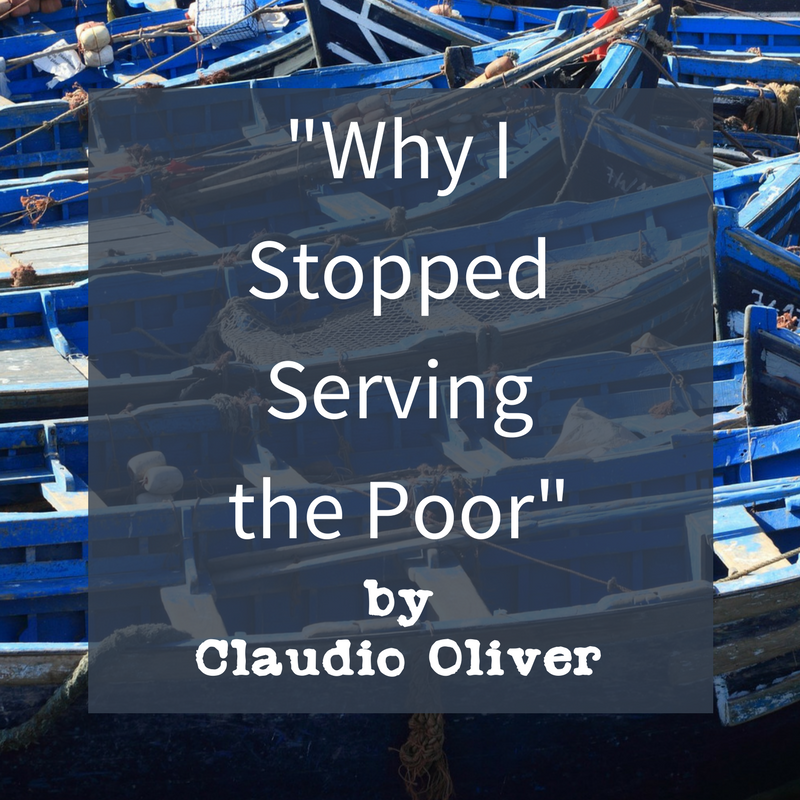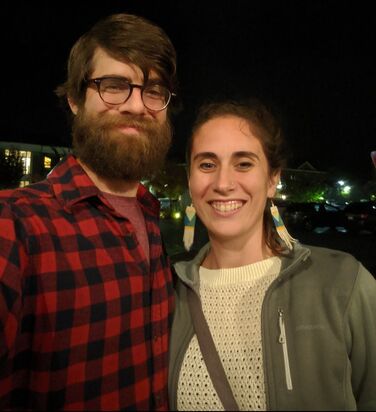 The sense of pride surprised me. I don't normally feel it in this way. Mostly these days, I feel tension. Yes, that is the feeling I most often have. Tension of sorrow and joy, of anger and compassion, of peace and war, of trying to grow a platform and hating platforms, of having too much and yet not having enough — the tensions of being human. As I reflected on the one-year mark of our family's new life in Tennessee, I felt a pride I didn't know was there. We did it. We stayed still. That might not sound like much to some, and to others it might make perfect sense. We've been a family on the move, in one way or another since Andrew and I said our vows nearly 11 years ago. Yes, we've stayed put in certain regions for much longer than 1 year, but in each of those ten years, we have had a major movement happen that created waves within our bodies and within our family. And for some strange reason that it is tough to type out on a page, this past year has felt like the most stable we have been. And for two risk-taking adventure-junkies, this feels like something to be proud about. Neither of us changed jobs in the past year, our son stayed in the same school, and our daughter moved schools mostly because of her age, not because we were seeking change. I hear so many Christians I admire and love talk about being rooted and grounded in life. And I confess part of me wants that and another part hates that idea. I also recognize that there are spiritual ways we are rooted and grounded because of the changing flow of our lives, not in spite of that flow. Yet there is a layer of that groundedness that we haven't felt. Sure, we've moved around internally and walked through some tough stuff in this past year; in fact, we're still walking through some mud. But, we stayed put. We're learning to sit with our questions rather than chase down the answers. Rather than feel like the answers are always right around the corner, and we have to go find them. I feel pride because it's been a wild decade, and in a crazy way, staying still feels like a renewed groundedness. For this, I am truly—and surprisingly—grateful.
0 Comments
For those vulnerable children being exploited,
or sought to be exploited—sexually, economically, or otherwise Lord protect them. Hedge their innocence. Be their Jehovah Shammah. Lord, hear our prayer. For those children that must work, whether by force or economic oppression, Protect their growing bodies, protect the health of their minds. Be their Jehovah Sabaoth. Lord, hear our prayer. For caregivers and parents, older siblings, aunts & uncles and grandparents Provide for these families. Be their Jehovah Jireh. Change laws & greedy rulers' hearts. Be their Jehovah Nissi. Lord, hear our prayer. For the dignity innate in every human being For the everlasting love you give all your children, Lord, let these children see and know and feel-- You are near and You are love. Be their Jehovah Rohi. Lord, hear our prayer. And for us, for those of us who can advocate for these children, equip us for this good work. That these children might know and see and love You more as they more deeply understand, Just how much You love them. Be all of our Jehovah Adonai. Lord, hear our prayer. Art and poem by Andres de Refugio Sarabia
Instagram: @werebothbatman Chiko Sapo like rain, the rain of human kindness—overflowing. The rain that washes my salty angry furious delirious, and deeply curious of the deaths I die every day. And the rain comes day in and day out, overflowing with kindness, again— yet remembering the violence, again. White boys screaming those fuckin' Mexicans again but this time, a twisted smile comes over me. That’s right, remembering the scriptures I've chased looking for answers, the truth, the truth, even the ones I’ve erased. Chillón Chillón, I’ll give you something to cry about! I turn the radio on, hoping to hear the good news that human kindness is overflowing. Nothing, nothing today. I hear my brothers are dying today. The news of violence again. I’m crying for rain today. Chillón Chillón, I’ll give you something to cry about! Mothers are holding their children, not for nursing, not for healing, not for comfort, but to bury them again in the dry, dusty earth. I wish it would rain today. I wish I could pray today. Chillón Chillón, I’ll give you something to cry about + Andres de Refugio Sarabia: Artist | Storyteller | Chillón. Keeps me searching for those hearts of gold, as i’m getting bolder every day. Texas born, California raised, woke to Tennessee. @werebothbatman 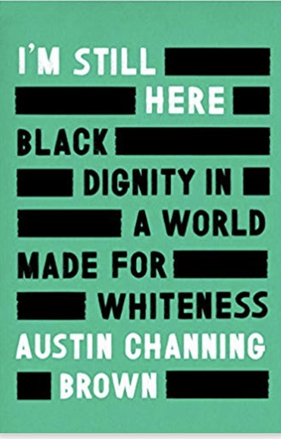 My friend Dee had been working at our predominantly white church for a few years when we became friends. We often talked about getting together but life got in the way for both of us. Then life brought us naturally together. Our boys ended up at the same school, and our families entered into a beautifully deep relationship none of us was expecting. Some days, my husband would pick up her son from school. He’d hang out at our house until she could come pick him up after work. She and I would often sit in my living room chatting about life and church and God and being working moms. These were sacred moments, and we had conversations that revealed the racist undertones of White American Evangelicalism that I knew were there, but I didn’t know know were there. Dee’s knowledge was intimate, her experience deep. As I recently listened to Austin Channing Brown’s book, I’m Still Here, I thought a lot about my conversations with Dee. “White Supremacy is a tradition that must be named in a religion that must be renounced. When this work has not been done, those who live in whiteness become oppressive whether intentional or not.” — Austin Channing Brown While Dee was still working at the church, my husband, Andrew, and I decided to leave. That decision was confirmed after a conversation with the pastor. There were several reasons, but the months leading up to the 2016 election cemented that decision. The amount of rhetoric around how Trump would lead us toward a more Christian politic in our nation made me want to flip tables. It seemed every white Christian around me had excused his immoral behavior because he was quote unquote conservative and would put conservative judges in the courts. His openly racist, misogynistic, and anti-immigrant talk was clearly unchristian to me (which led me to write the article The Abortions of White American Evangelicals that distanced me even more from the spiritual community I had been a part of for a good portion of my adult life). Yet so many of my nonwhite Christians friends saw Trump differently, they saw his immoral behavior and called it out. Andrew and I knew we were at a turning point in our faith walk. We could not continue to attend this church. We had the privilege to walk away. I was questioning our church’s leadership as much as Dee was. And, although I was planning on teaching a course the following semester with a program within the church, when I left, they took my book out of the bookstore and I was not allowed to teach the course. Still, the act of resistance was easier for me and my family—the church wasn’t a source of economic income. Dee and I would have two-hour-long conversations twice a week during that time. When Dee left our house, I’d often meditate on them: how much she’d spur me to deeper faith, the way she’d talk about the Spirit, and how social justice didn’t seem to be an add-on to her faith but rather part of its DNA. Our connection was strong, and we were able to be honest with each other in ways I’ve never been with anyone else. I wondered why my friends in positions of church leadership weren’t listening to her. Her voice was so prophetic, yet she was so often silenced. But why? Now, years later, I realize I’ve still be wondering the same thing. Brown shed light on my unanswered question: “This is why white American churches remain so far from experiencing anything resembling reconciliation. The white Church considers power its birthright rather than its curse. And so, rather than seeking reconciliation, they stage moments of racial harmony that don't challenge the status quo. They organize worship services where the choirs of two racially different churches sing together, where a pastor of a different race preaches a couple of times a year, where they celebrate MLK but don't acknowledge current racial injustices. Acts like these can create beautiful moments of harmony and goodwill, but since they don't change the underlying power structure at the organization, it would be misleading to call them acts of reconciliation. Even worse, when they're not paired with greater change, diversity efforts can have the opposite of their intended effect. They keep the church feeling good, innocent, maybe even progressive, all the while preserving the roots of injustice.” (Italics mine) Power is a greedy thing. And sadly, its expansive ruthlessness is often cloaked in “Doing God’s will” rhetoric. But God showed us a very different example of true power in the life of Christ. God’s equation for power is more like: humility equals power. And honestly, that equation sucks. It goes against all of our earthly values, all of our American values. All of our American Dreams. It’s not easy to accept Jesus for all of who He is. The full Christ is offensively countercultural. “One of the most meaningful passages of Scripture for me is found in the New Testament, where Jesus leads a one-man protest inside the Temple walls. Jesus shouts at the corrupt Temple officials, overturns furniture, sets animals free, blocks the doorways with his body, and carries a weapon—a whip—through the place. Jesus throws folks out the building, and in so doing creates space for the most marginalized to come in: the poor, the wounded, the children. I imagine the next day’s newspapers called Jesus’s anger destructive. But I think those without power would’ve said that his anger led to freedom—the freedom of belonging, the freedom of healing, and the freedom of participating as full members in God’s house.” One of the saddest things about the racism of White Evangelicalism is that the Christ who is so sincerely proclaimed from the pulpit is not fully seen, expressed, or taught. I firmly believe that the robustness of the true Gospel of the Kingdom of God cannot be seen only from one perspective. Yet, it is most often the powerful in society—in ethnicity, in gender, in able-bodies, in economic status—that tell us who Jesus is. Yet they skip over the one-man protest Jesus and tell us (as I was often told growing up) that Jesus is the only one who is allowed to be angry because he’s the only one righteous enough to have just anger. We so often talk about how we need to include the voices on the margins but silence those same voices even when they are already sitting at the table, when they are asking questions with answers that might reveal our greed for power, when they seem angry and we don’t want to ask why they are protesting against the status quo. When they kneel when we think they should stand, and stand when we think they should kneel. We silence Dee and Austin and so many others who have a prophetic perspective of Christ that we white Evangelicals desperately need. And it is to our collective detriment. We want their faces in our marketing pictures, maybe even their names on our payroll, but we don’t want their ideas, their initiatives, their pushback, their balance, their accountability, their prophecy. Because power is our birthright not our curse. Dee no longer works for the church, and she’s flourishing in her new role. We no longer live near each other, but those long conversations remain deep and close to my heart, a constant reminder of the oppression of the white Church, and at the same time, a reminder of what deep spiritual community should be: iron sharpening iron, spurring each other on to greater works of faith. “And even though the Church I love has been the oppressor as often as it has been the champion of the oppressed, I can’t let go of my belief in Church—in a universal body of belonging, in a community that reaches toward love in a world so often filled with hate. I continue to be drawn toward the collective participation of seeking good, even when that means critiquing the institution I love for its commitment to whiteness.” — Austin Channing Brown. *author notes* Everything in Purple is Austin Channing Brown's words from I'm Still Here which you can purchase on Amazon. Dee gave me permission to tell this portion of her story. 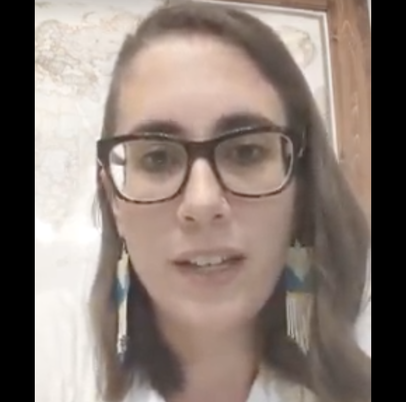 "No matter how hard you try to shake him, the god of scarcity is a sticky deity." — Alia Joy, Glorious Weakness. I struggle with how much I feed the god of scarcity when I greedily hoard my time. What do you hoard? What areas of your life is the god of scarcity an idol? And who is the God of Abundance? Can we trust him with everything? "Son, life is about sharing. Don't give what you have left over, rather share what you have now." — María Romero as quoted in Separated by the Border (out Oct. 29) 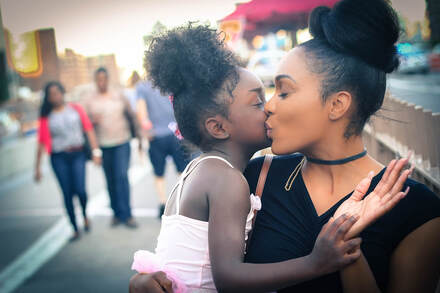 At the very end of my book, Separated by the Border, I use the possessive pronoun “Her” and I talk about God as Inclusive Mother. I know many of my evangelical peers will struggle with this phrase, which is why I wrote this blog. If you have had the opportunity to read the book, you may see this as an overarching theme. I didn’t try to make it a theme, but Lupe’s love showcased the beautifully relentless love of a mother which gave me a deeper understanding of God’s love. So I want to lay out why I chose to use such language and why I think it’s important. Let’s start at the beginning. All verses are in the NIV unless otherwise noted. Genesis 1:2
Now the earth was formless and empty, darkness was over the surface of the deep, and the Spirit of God was hovering over the waters. The word Spirit is the word Ruach in Hebrew. It means Breath or Wind. Genesis 1:26-27 (NASB) Then God said, “Let Us make man in Our image, according to Our likeness; and let them rule over the fish of the sea and over the birds of the sky and over the cattle and over all the earth, and over every creeping thing that creeps on the earth.” God created man in His own image, in the image of God He created him; male and female He created them. Some theologians read this and say that God’s image holds both male and female in it if in God’s likeness we are being created. Genesis 2:18 The Lord God said, “It is not good for the man to be alone. I will make a helper suitable for him.” This word “helper” found here is the Hebrew word EZER which is also used several times throughout the Bible to describe God. (Ex. 18:4, Deut 33:7, 33:26, 33:29, Ps. 20:2, 33:20, 70:5, 89:17, 115:11, 121:1-2, 124:8, 146:5, Hosea 13:9) Deuteronomy 32:10-12, 18 In a desert land he found him, in a barren and howling waste. He shielded him and cared for him; he guarded him as the apple of his eye, like an eagle that stirs up its nest and hovers over its young, that spreads its wings to catch them and carries them aloft. The Lord alone led him; no foreign god was with him. (18) You deserted the Rock, who fathered you; you forgot the God who gave you birth. Psalm 131:2 But I have calmed and quieted myself, I am like a weaned child with its mother; like a weaned child I am content. This is a Psalm of David where he is speaking directly to the LORD. Isaiah 42:14 For a long time I have kept silent, I have been quiet and held myself back. But now, like a woman in childbirth, I cry out, I gasp and pant. Isaiah 49:15 Can a mother forget the baby at her breast and have no compassion on the child she has borne? Though she may forget, I will not forget you! Isaiah 66:12-13 I will extend peace to her like a river, and the wealth of nations like a flooding stream; you will nurse and be carried on her arm and dandled on her knees. As a mother comforts her child, so will I comfort you; and you will be comforted over Jerusalem. Hosea 11:3-4It was I who taught Ephraim to walk, taking them by the arms; but they did not realize it was I who healed them. I led them with cords of human kindness, with ties of love. To them I was like one who lifts a little child to the cheek, and I bent down to feed them. Matthew 3:16-17 (NASB) along with Mark 1, Luke 3, John 1 — The Baptism of Jesus After being baptized, Jesus came up immediately from the water; and behold, the heavens were opened, and he saw the Spirit of God descending as a dove and lighting on Him, and behold, a voice out of the heavens said, “This is My beloved Son, in whom I am well-pleased. In the Baptism of Jesus, we read that the Spirit of God descended on Jesus like a dove and then a voice from heaven says, "This is my Son, in whom I am well pleased." We often assume that the voice from Heaven is Father God's voice. But God the Father is never mentioned in this passage. It is the Holy Spirit who is mentioned. What if it is the Holy Spirit who is doing the speaking? What if the Holy Spirit is saying, "This is My beloved Son." I think that if we can theorize that it's God the Father's voice, we can also theorize that it's God the Mother's voice, who has sent a dove to her son to remind him in physical form she's there and she's watching over. Matthew 23:37 & Luke 13:34 Jerusalem, Jerusalem, you who kill the prophets and stone those sent to you, how often I have longed to gather your children together, as a hen gathers her chicks under her wings, and you were not willing. Luke 15:8-10 Or suppose a woman has ten silver coins and loses one. Doesn’t she light a lamp, sweep the house and search carefully until she finds it? And when she finds it, she calls her friends and neighbors together and says, ‘Rejoice with me; I have found my lost coin.’ In the same way, I tell you, there is rejoicing in the presence of the angels of God over one sinner who repents. I have to give Emmy Kegler credit for this one. I was listening to a podcast where she was being interviewed for her book One Coin Found, and she said that while studying scripture one day she was looking at the Lost Parables in Luke: The Lost Sheep, The Lost Coin, The Lost Son. She described how we often see God as the shepherd in the parable of the lost sheep. And we often see God as the father in the parable of the lost son, but rarely do we teach that God is the woman searching for her lost coin. John 3:6 Flesh gives birth to flesh, but the Spirit gives birth to spirit. Females give birth, and it’s possible this is a figure of speech. Maybe all the verses above are merely figures of speech, metaphors and similes. But maybe in the same spirit (pun intended) my use of SHE is a figure of speech when referring to God. And if so, why do so many people see that as a faux pas? Because in many ways we cannot define God fully, so in every attempt to do so we are only using figures of speech. Some theologians and some denominations are pushing for genderless pronouns for God. For me, I struggle with this and here’s why: taking the gender away from God makes God less understandable, less tangible, less relatable to me. Andrew and I chose not to know the gender of our second child until the day of her birth. It was hard for me to connect with the baby in my belly because I didn't know what to call the baby: it, baby. That was all the language we had. The surprise on her birthday was big, but I would never do it again. I wanted to connect with the being inside of me during pregnancy and not knowing her gender during that time made it harder to connect. I grew up in a Pentecostal-like church and the Holy Spirit was a very undefinable being, a ghost that slayed people and made weird things happen. For a portion of my life, I ran away from the Holy Spirit because I feared the weirdness of Her. For more on that, check out my article at Missio Alliance. Seeing the Holy Spirit as a mother-figure does three important things:
When I say that God is Mother, and when I use a feminine pronoun for God, I am not saying that God is only Mother or only female. I believe that God transcends gender. But here, I am saying that one way to see God is to see Mother God, alongside Father God, and Brother God. There is no disunity in the Trinity, though most of my life I secretly thought this was the case. I see the unity so much more when I see the Trinity as Divine Family. I will leave you with the words of Jurgen Moltmann, a German reformed white male theologian. From his book The Spirit of Life: A Universal Affirmation: In Trinitarian theology, the image of the divine family raises the Spirit to the same rank as the Father, and puts the Spirit before the Son. Unless, like Ludwig Feuerbach, we wish to cast the image aside altogether as a pure projection of a family idyll, it does offer interesting corrective possibilities, if we compare it with the other pictures of the Trinity - Irenaeus's image of the One God with two hands, for example. But more important than these speculative possibilities is the new definition of what it means for human beings to be the image of God. If the Trinity is a community, then what corresponds to it is the true human community of men and women. A certain de-patriarchalization of the picture of God results in a de-patriarchalization of the church too. Of course by calling God the Holy Spirit 'Mother' we are merely putting parallel to the 'Father' another power as primal source. Psychologically speaking, inward liberation from the mother is as much a part of human development as emancipation from the Father. Like Israel's prophets, Christianity actually replaced the patriachal and matriarchal powers of origin by the messianism of the Child, as the bearer of hope and the beginning of the future. 'Unless you become like children, you will never enter the kingdom of heaven' (Matt 18:3). But this is not brought out by the patriarchal or matriarchal image of God. 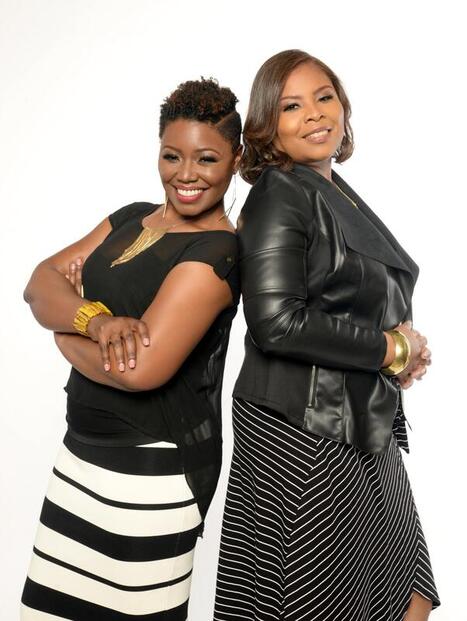 This Wednesday, I am highlighting a good friend of mine, Latresia "Sweet" Peak and her good friend, Holly Harris. The two just released their debut album, 2 for the Price of 1 on June 1. Sweet and Holly have been singing for as long as they can remember. They are both worship leaders with a strong desire to see the Body of Christ & beyond experience the power of worship. They have had the privilege of serving in their local churches, various groups and para-church ministries. Sweet and Holly met on the campus of UNC Charlotte as students and members of Children of the Sun Cultural choir. COS became the catalyst for a friendship that later blossomed into a musical partnership. In early 2017, Sweet and Holly joined forces to plan their first live recording. In doing so, they were able to split cost, encourage one another and benefit from each other's strengths and connections. However, this was more than just a great practical idea, it was a God idea. Coming together required humility, selflessness, self assuredness, patience and a relinquishing of control. In addition, they experienced the hand of God miraculously move in the area of provision! One of my favorite songs on the album is called Talk About It which has a juke-joint vibe: If we say that love covers a multitude of sin, then why are Sunday services so segregated? Can we talk about it? Let's talk about division Let's talk about our past Let's talk about hatred Let's talk about crime Let's have a dialogue And get it all off our chest How are we to ever reconcile our differences? Sweet wrote it a few years ago when police killings were happening regularly. "I had a conversation with a friend who was a believer and we were discussing race and I thought not only is the world segregated, but so is the church," Sweet said. "I hope the song makes everyone stop and think: Am I helping to build bridges of reconciliation or am I building walls of division? How can we each individually be the change? How can we communally be the change?" Awesome God is another great song on the album: Your sovereign Lord, You reign You reign from age to age This whole world can pass away but Your Word will never fade We stand in awe of You and our praise can't be contained So in spirit and in truth We will bless Your holy name "Awesome God is a mid-tempo worship song about the sovereignty of our God. From the beauty of His creation to the breath we breathe, His glory surrounds us all! It was my goal to write a song that expressed how incredible He is," Holly said. "As a result, my hope is that all would experience His presence and love." If you are interested in having Sweet and Holly come and sing at your event or church, send an email to tornroofent@ gmail.com If you are interested in Sweet leading a conversation about racial justice, email Sweet at latresiap@ yahoo.com with the subject "Race Relations". You can help them out by sharing their music, following them on Spotify, listening to their music, having (paying!) them come to your church and sing, and sharing this post! 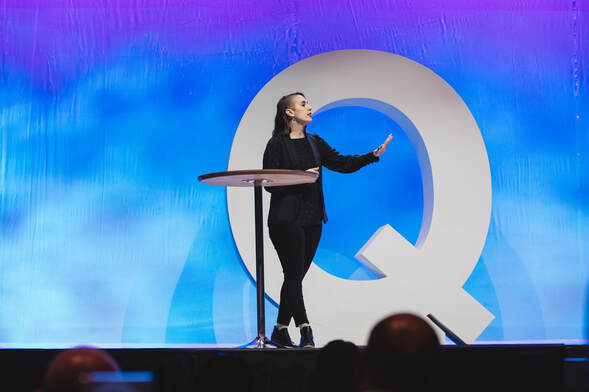 The following is from my 9-minute talk at the Q Conference: There is a daughter I mother A daughter I love But she is not mine & I am not hers, Forever. There is a mother she loves A mother who loves her, Forever. For love is like water. No human border can keep it out. Yes, love is like water It moves above in clouds, & below in soil Yes, love is water. In February 2018, I became a foster mom to a 5-year-old Honduran girl, Julia, who had been labeled an unaccompanied minor when she crossed into the U.S. But she wasn’t unaccompanied. In October 2017, she along with her mother, Lupe, and stepdad, Carlos, were at the mercy of the smugglers they paid $7,500 to as they journeyed from Honduras through Guatemala and up through Mexico to arrive at the US. But at the last stop in northern Mexico, the smugglers took Lupe, the mother, as a hostage. Julia and Carlos crossed the Rio Bravo, but Lupe stayed behind, and was exploited sexually. It’s unclear why Customs & Border Protection separated Julia from her stepdad after processing them. Carlos was deported, and Julia was placed into a sponsorship family. A few months later, Lupe, the mother escaped the smugglers and returned to her home in Honduras about the same time that little Julia entered foster care due to neglect from her sponsorship family. Over a period of four months, with the creative and determined help of local social workers, the Honduran Consulate, and my family… in July of 2018, my husband Andrew and I traveled with Julia back to Honduras. At the airport, when Julia saw her mother, she gleefully ran through the automatic doors. Lupe scooped her up and Julia laid her head on her mother’s shoulder, letting tears fall as her mother’s arms enveloped her. Wordless groans and squeezes communicated a love—a longing—a thirst—too deep for words. Eight months apart was eight months too long. It was an incredibly beautiful and heartening reunification, complete with an Elsa-themed welcome-home party. If you don’t know who Elsa is, ask any 5-year-old girl. But be careful, you may get an unwanted song stuck in your head. Love is like water after a long, hard battle with red tape working to undo what our government is responsible for. 2,737 children were forcibly separated from their parents when they crossed into the U.S. under the zero-tolerance policy between April and June of 2018. Reports are now showing thousands more had been separated prior to April, and more had been separated after June. Love is like water no human border can keep it out. But,
Are just some of the ways love has been contaminated by a source that SHOULD NOT have access to it. Forced separation causes lifelong trauma for both children and parents. We don’t want to admit how familiar all of this is in America. African Americans, Native Americans, Asian Americans and Latino Americans have all suffered forced family separations at the hands of OUR government. Beyond the zero-tolerance policy, families are separated every time ICE deports a parent, leaving behind children. I had an opportunity to visit an immigration detention facility in the fall of last year. There, I met another immigrant mother, Jovita. In front of her 6 and 8-year-old American daughters, Jovita was handcuffed by ICE and taken away from her decade-long home in Alabama. Her 8-year-old has since tried to commit suicide, in constant fear that ICE will come for her father just as they came for her mother. In response to family separations my friend and poet Carolina Hinojosa-Cisneros wrote a poem called Blessed Be the Mother. This is a small portion of her words: On holy land, between a mesquite shrub And a Mexican willow whose purple buds bow In adoration, a mother sets out on a pilgrimage… On holy land, between a tent city in Tornillo And the lurking eyes of government institutions, She prays her rosary, beads she must recall by faith Since their confiscation at port of entry… Blessed be the mother who spreads her wings in resistance. Blessed be the mother who reclaims her land. Blessed be the mother who meets the devil nose to nose until her hijitas and hijitos are returned to her. Bendita sea la madre. These pilgrimages don’t always end in reunification. Bodies are beaten and broken when mothers try and try to cross a border fighting to bring life to the lives they brought into this world. As Christians in the United States, we must look at the holy ground of our southern border. We must look and lament. [pause] At my work, we talk a lot about the UNCONSCIOUS stories that guide our behavior. The question is, deep in our core, what do we believe a human being is? If human beings are only their souls, then we can justify ANYTHING done to the bodies of our neighbors. Concerning ourselves only with eternal salvation, we become complicit in state- and church-sanctioned acts of dehumanization. If human beings are only their economic worth, we then dehumanize our neighbors and ourselves as we filter the world through a scarcity mentality. WE, the followers of the God of communal abundance —the God of Jubilee— FEARFULLY decide there’s not enough to go around. The Good News, the whole gospel of the kingdom of God, is that Jesus is making all things new. Christ — being fully God and fully man — breathes abundant life into our humanity. He is the Good news to the poor, freedom to prisoners, freedom to the oppressed. We must not forget that the body of Christ our King was beaten and bruised and broken as he fought to bring abundant life and light into this world. King Jesus is The King of the Broken. We are ALL broken, All seeking to flourish All desperate for neighbors who seek our flourishing All called to be neighbors who seek the flourishing of others. Yes, love is water Love is Living Water And we are all thirsty.  The mentality of scarcity—maybe a spirit of scarcity—prowls like a lion seeking to devour us. The God of communal abundance, the God of shalom, is calling us out of its clutches. The foundation of holistic poverty equates to broken relationships. At my work, we often reference a figure of the four broken relationships that can be found in Walking With the Poor by Bryant Myers. Those relationships include with God, Self, Others, and Creation. “Poverty is a result of relationships that do not work, that are not just, that are not for life, that are not harmonious or enjoyable. Poverty is the absence of shalom in all its meanings,” Myers says. (Walking With the Poor, p. 86) With this in mind, I believe that discipleship at its core is a process for us to become more whole — that is, for our relationships to be reconciled. Therefore, this mentality of scarcity that seems to keep bobbing its head in many of the discussions I have with others is not new news. If poverty is unreconciled relationships that cause us to not be whole human beings, then the enemy that prowls around like a lion seeking whom he can devour will constantly want us to perceive that someone else is trying to take that wholeness away from us. He must pit us against our neighbor, the very neighbor God calls us to love. You see, if the enemy can convince me that my neighbor is going to take away that which I’ve worked hard to obtain in my process of becoming whole, then in my attempt to seek wholeness, I will also hoard the stepping stones toward it. And if I hoard what I perceive as a means to the end of wholeness, then I will never actually arrive at my destination of becoming whole. In their book Becoming Whole, Brian Fikkert & Kelly M. Kapic argue that we, dominant-culture American Christians, have been leaning into a theology that is essentially Evangelical Gnosticism that idolizes the American Dream. They say, “the goal isn’t to live the American Dream now and get our souls to heaven later. The goal is to become whole.” We have become an easy target for the prowling enemy. As we continue to seek what we think is wholeness through stepping stones that are made quite slippery by the American Dream, we easily fall prey to the ideas that the tangible & intangible things—titles, certificates, retirement money, discounts on products that require cheap labor, citizenship, power, privilege—will lead us to wholeness, but we must protect them at all costs. And so we see this mentality of scarcity affect each of us: whether it’s in the power dynamic between genders and races both inside and outside of the Church, the argument against immigration, the movement out of public schools, the silencing of sexual abuse victims (or even highlighting of them when we want to on our terms). When we take a step back, we can clearly see this mentality of scarcity influences all of us. None of us is immune to scarcity. Some because of trauma. Some because of power. Some because of privilege. Some because of oppression. All because we are human. But the God of shalom, the God of communal abundance calls us out of the clutches of this lie. He, through gleaning and jubilee and downward mobility and community reconciliation calls us to a place where we see first and foremost that He is enough. Yes, God is enough. Jesus is enough. No Christ didn’t come riding on a white horse slashing oppression by being oppressive like we all wanted him to. But Christ, who deeply knew what it was to be human and fully understood suffering is enough. And once we see that Christ is enough, we also see that we are enough. Not only in our limited humanity, but also in our communities. We don’t need more stuff—tangible or intangible. We don’t need more human, greedy power. We are enough. Our humanity is enough. We are allowed to honestly confess the ways we hurt each other. We make space for difficult truths to be told because we see each other as human beings first. We don’t judge, we confess. And in our confession we find God-ordained empathy for our neighbors we thought were our enemies. Finally, we see that the American Dream is NOT enough. We don’t need it. It’s not enough because it doesn’t make us whole. It’s individualized and doesn’t take into consideration the systems of oppression we have built our country upon. We’ve proven that becoming richer makes us less happy (Becoming Whole, Introduction). The mentality of scarcity is combatted by a mentality of community. “We’ve lost the sense that we are all in this together, that my flourishing is bound up with yours, and that we’re called to love our neighbors as ourselves.” (Becoming Whole, Ch. 3). So wherever you live, whatever you do ... find your community and press in, lean in, and bind yourself up with your neighbors. I'll work on doing the same. Me.
I rub my forefinger along the line where no hair grows. I remember. My body was broken when I brought life into this world. Twice it broke. Twice it hurt. I am broken. Her. She has no scar, but she remembers. Her body was broken when she tried & tried to bring life into this world. A thousand times broken. And people who knew not what they did called her Barren. Broken. Ella. Her body is covered in scars, she will never forget. Her body was broken when she tried & tried to cross that border to bring life to the life she brought into the world. A thousand times broken. And people who knew not what they did called her Illegal. Broken. You. Your body keeps Love's score. We will never forget. Your body was bruised and broken and beaten as you brought life and light into the world. A thousand times broken. And people who knew not what they did called you Names. King of the Jews. Broken. King of my broken heart. King of the broken hearted. King of the broken. |
Gena's
|


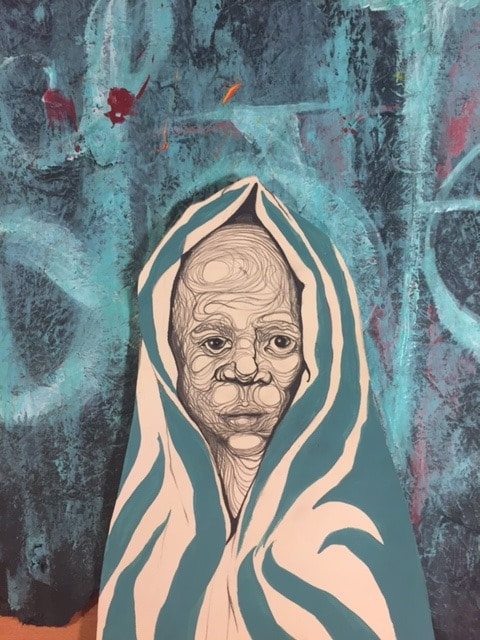
 RSS Feed
RSS Feed

